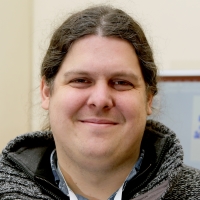Biography
I completed my PhD in Chemistry at the University of Canterbury, New Zealand in 2012 under the supervision of Prof Paul Kruger, where I studied the coordination chemistry of pyrazole and indazole ligands in helicates and coordination polymers. Afterwards, I spent 3 years as a postdoctoral researcher at Monash University, Australia working on Metal-Organic Frameworks for carbon dioxide capture in the groups of Prof Stuart Batten and Dr David Turner, on a collaborative project funded by the Science and Industry Endowment Fund (SIEF).
In 2015 I relocated to Trinity College Dublin, Ireland to take up an Irish Research Council Postdoctoral Fellowship, working with the group of Prof Thorri Gunnlaugsson on fluorescent coordination polymers for chemical sensing. Following this I was appointed as a Lecturer in Inorganic Chemistry in the School of Chemical and Physical Sciences at Keele University in late 2017.
For more information on my group, please visit the Hawes Research Group website
Research and scholarship
My research interests are based in supramolecular coordination chemistry and the synthesis of functional and responsive materials. In general, my research projects involve a substantial component of single-crystal X-ray crystallography, using laboratory and synchrotron sources, to probe the fascinating structural chemistry of these systems. As well as a large synthetic chemistry component, my research involves a wide variety of physical and spectroscopic characterisation techniques, and research projects can readily be tailored to the particular interests of students.
My current research is focused in two broad categories:
1) Metal-Organic Frameworks for adsorption, extraction and separation

Metal-Organic Frameworks (MOFs) are an exciting class of coordination compounds in which metal ions are linked by bridging ligands into crystalline, polymeric networks. These materials contain nanoscale pores which can be chemically tailored for carrying out specific functions. As well as their excellent potential for CO2 capture, my interest in these materials is their ability to selectively extract and concentrate dissolved species from the solution phase, which has particular relevance for chemical separation and extraction technologies. I am especially interested in developing new ligand systems for these materials, to incorporate additional chemical functionality or unusual structural properties.
2) Fluorescent sensing in coordination polymers and polynuclear coordination compounds

Fluorescent sensors are an attractive prospect for a broad range of applications, including environmental monitoring, quality assurance and security, because of the excellent sensitivity which can be achieved in these systems. My goal is to use the principles of host-guest chemistry and a class of particularly environment-sensitive fluorophores to develop fluorescent sensors for weakly-interacting analytes which do not undergo strong analyte-fluorophore interactions. These sensors are constructed within metallo-supramolecular systems, including cages, MOFs and metallogels, giving wide scope for utility. Mixtures containing organic analytes which are incapable of quenching fluorescence (thereby being difficult to detect) are particularly interesting targets for this study.
Teaching
CHE10065 Environmental and Sustainable Chemistry
CHE10085 Chemistry Connections
CHE20037 Industrial Chemistry
CHE20055 Molecular Chemistry and Reactions
CHE30043 Materials Chemistry and Catalysis
CHE30056 Advanced Physical and Inorganic Chemistry (Module Leader)
CHE30050 Chemistry/Medicinal Chemistry Research Project
CHE40021 MChem Research Project (Module Leader)
CHE40034 MChem Medicinal Chemistry Research Project (Module Leader)
CHE40048 Advanced Topics in Chemistry and Medicinal Chemistry
Publications
School address
Lennard-Jones School of Chemical and Physical Sciences
Lennard-Jones Building
Keele University
Staffordshire
ST5 5BG, UK
Phone (School Office): +44 (0)1782 733033, (Chemistry): +44 (0)1782 731693, (Forensic Science): +44 (0)1782 731694, (Physics): +44 (0)1782 733527
Email: scps@keele.ac.uk
Information for schools and colleges
Programme directors
Chemistry and Medicinal Chemistry
Dr Tess Phillips
Tel : +44 (0)1782 733038
Email : t.r.phillips@keele.ac.uk
Dr Chris Hawes
Tel : +44 (0)1782 732820
Email : c.s.hawes@keele.ac.uk
Forensic Science
Dr Jamie K. Pringle
Tel : +44 (0)1782 733163
Email : j.k.pringle@keele.ac.uk
Physics and Astrophysics
Dr Arumugam Mahendrasingam
Tel : +44 (0)1782 733312
Email : a.mahendrasingam@keele.ac.uk
Admission tutors
Chemistry and Medicinal Chemistry
Dr Natalie Capel
Tel : +44 (0)1782 733584
Email : n.j.capel@keele.ac.uk
Forensic Science
Dr Natalie Capel
Tel : +44 (0)1782 733584
Email : n.j.capel@keele.ac.uk
Physics and Astrophysics
Dr Patrick Connell
Tel : +44 (0)1782 733892
Email : physics@keele.ac.uk or p.j.connell@keele.ac.uk


